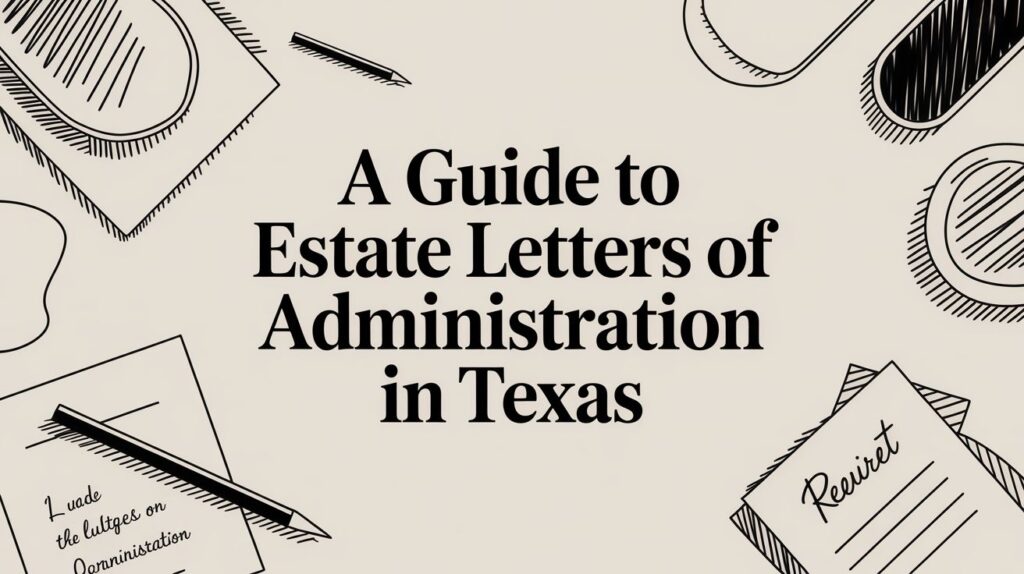When a loved one passes away in Texas and their estate enters probate, real estate often becomes a key asset in the settlement process. As the executor or administrator, one of your responsibilities might be to sell this property. Ensuring that the probate real estate sells for its fair market value (FMV) is essential, not only to honor the wishes of the deceased but also to ensure all beneficiaries receive their rightful share. This article will explore the process of selling real estate during probate in Texas, focusing on key steps, strategies for ensuring a fair sale price, and best practices for navigating legal and financial complexities.
Understanding Probate in Texas
Probate is the legal process of distributing a deceased person’s estate according to their will or Texas intestacy laws if no will exists. Real estate is often a significant part of an estate, and in some cases, it needs to be sold to cover debts or distribute assets more equitably among beneficiaries.
In Texas, probate law distinguishes between independent and dependent administration:
- Independent Administration: This is the more common, simplified probate process. Executors have greater flexibility and can sell real estate without obtaining court approval for every step.
- Dependent Administration: In this more court-supervised process, the executor must seek court approval for most decisions, including selling real estate. The sale must often be at fair market value to protect the interests of all heirs and beneficiaries.
Regardless of which type of probate applies, selling real estate at a fair market price is crucial.

What Is Fair Market Value?
Fair Market Value (FMV) refers to the price at which a property would sell in a competitive and open market, under normal conditions, with both buyer and seller acting without undue pressure. In other words, FMV is the true value a property would fetch, based on comparable sales, the condition of the property, and current market trends.
Achieving FMV in a probate real estate sale is vital because:
- Equity Among Heirs: Beneficiaries expect their shares to be based on the true value of estate assets. A below-market sale may cause disputes or legal challenges.
- Debt Payments: If the estate owes debts, undervaluing real estate could leave less available for settling obligations, potentially impacting other beneficiaries.
- Avoiding Liability: Executors are legally bound to act in the best interests of the estate. Failing to secure FMV could expose them to liability or lawsuits from disgruntled heirs.
Steps to Ensure Fair Market Value for Probate Real Estate Sales in Texas
Ensuring FMV for probate real estate requires careful planning, professional support, and transparency. The following steps outline best practices for executors looking to achieve the highest possible sale price for a probate property.
1. Conduct a Property Appraisal
An independent property appraisal is a crucial first step in determining FMV. A certified appraiser will evaluate the property based on its location, condition, size, and features, comparing it to recent sales of similar properties in the area. The resulting appraisal provides an unbiased estimate of the property’s current market value.

Texas law often requires appraisals for probate properties, particularly in dependent administrations, where court oversight is stricter. Even in independent administration, an appraisal is useful as a benchmark to guide the listing price and sale strategy.
2. Research Comparable Sales (Comps)
In addition to a professional appraisal, researching comparable sales, or “comps,” helps ensure the property is priced fairly. Comps are recent sales of similar properties in the same area. They provide real-world examples of what buyers are willing to pay for properties like the one in probate.
Real estate agents can provide valuable insight into comps, but online tools and databases also allow executors to research neighborhood trends and historical pricing data. Reviewing at least three to five comparable sales within the last six months can help create a clearer picture of the local market.
3. Make Necessary Repairs or Upgrades
Probate properties are often older homes or homes that may not have been well-maintained in the years before the owner’s passing. To maximize the sale price, consider making necessary repairs or cosmetic upgrades. Simple fixes, such as fresh paint, new flooring, or repairs to broken fixtures, can increase the property’s appeal without a significant investment.
However, it’s important to weigh the cost of repairs against the potential increase in the sale price. Some probate estates may not have the funds available for major renovations, so it’s often best to focus on low-cost improvements that yield a high return on investment (ROI).
4. Hire a Real Estate Agent Experienced in Probate Sales
Working with a real estate agent who has experience with probate properties can streamline the sale process. These agents understand the unique requirements of probate real estate, from handling court-ordered sales to marketing the property effectively. They can also help ensure that all necessary legal documentation is filed correctly.
An experienced agent will help set an appropriate listing price based on the appraisal, comps, and current market conditions. Additionally, they can help negotiate offers and ensure that the property sells for a fair price.
5. Market the Property Effectively
Effective marketing is key to attracting potential buyers and securing FMV for probate real estate. Work with your real estate agent to develop a comprehensive marketing plan, which may include:
- Online Listings: Ensure the property is listed on popular real estate websites, with professional photos, virtual tours, and detailed descriptions.
- Open Houses and Showings: Host open houses and private showings to allow interested buyers to tour the property.
- Targeted Advertising: Consider using online and print advertisements to target local buyers who may be interested in the property.
The more exposure the property receives, the higher the likelihood of receiving competitive offers that reflect its true value.
6. Court Approval for the Sale (If Necessary)
In a dependent administration, court approval is required before selling probate real estate. Executors must file a petition with the probate court and often provide evidence that the sale price reflects FMV. The court will typically require an independent appraisal or comparable sales data to support the proposed sale price.
Even in independent administration, obtaining court approval for a sale can provide additional legal protection for the executor, ensuring that beneficiaries or creditors cannot challenge the transaction later.
7. Handle Multiple Offers Carefully
In competitive real estate markets, it’s not uncommon to receive multiple offers on a probate property. While it may be tempting to accept the highest bid, it’s important to carefully review each offer’s terms. For instance, an all-cash offer with a quick closing may be more desirable than a higher offer that comes with financing contingencies or repair demands.
Work closely with your real estate agent to evaluate the pros and cons of each offer, ensuring that the chosen bid provides the best overall value for the estate.
8. Comply with Legal and Tax Obligations
Throughout the sale process, executors must ensure compliance with Texas probate law and federal tax obligations. This includes:
- Filing the Estate’s Final Tax Returns: If the sale generates a profit, the estate may be subject to capital gains tax. Consult with a tax professional to determine if any taxes are owed and ensure that all filings are completed correctly.
- Settling Debts: Proceeds from the sale may need to be used to pay off outstanding estate debts, such as mortgages, liens, or medical bills.
- Distributing Proceeds to Beneficiaries: Once debts and expenses are settled, the remaining funds from the sale must be distributed to beneficiaries according to the terms of the will or Texas intestacy laws.

9. Maintain Transparency with Beneficiaries
Communication is essential when selling probate real estate. Keep beneficiaries informed throughout the process, from the initial appraisal to the final sale. Providing regular updates helps build trust and reduces the risk of disputes later on. Transparency also ensures that beneficiaries understand the reasoning behind key decisions, such as listing price, repairs, or accepting specific offers.
Common Challenges in Probate Real Estate Sales
Despite careful planning, selling probate real estate can present several challenges. Some common issues include:
- Disagreements Among Heirs: Family members may disagree on whether to sell the property, what price to accept, or how proceeds should be distributed.
- Complex Title Issues:Probate properties may have unclear titles due to past ownership disputes, liens, or unrecorded transactions. Clearing the title may require legal assistance, adding time and expense to the sale process.
- Economic Market Fluctuations: Real estate markets can fluctuate rapidly, affecting the FMV of probate properties. If the market declines significantly, it may be challenging to sell the property for its appraised value.
In these cases, legal counsel, real estate professionals, and probate court guidance can help resolve issues and keep the sale on track.
Conclusion: Maximizing Value for All Parties
Ensuring fair market value for probate real estate sales in Texas requires a mix of due diligence, professional expertise, and careful planning. By following the steps outlined above, executors can protect themselves from legal challenges while ensuring that beneficiaries receive their rightful inheritance.
Remember that selling probate real estate isn’t just about getting a good price—it’s about honoring the wishes of the deceased and treating the estate’s assets with the care and respect they deserve. With the right approach, you can navigate the complexities of Texas probate real estate sales successfully, achieving a fair and equitable outcome for all parties involved.








